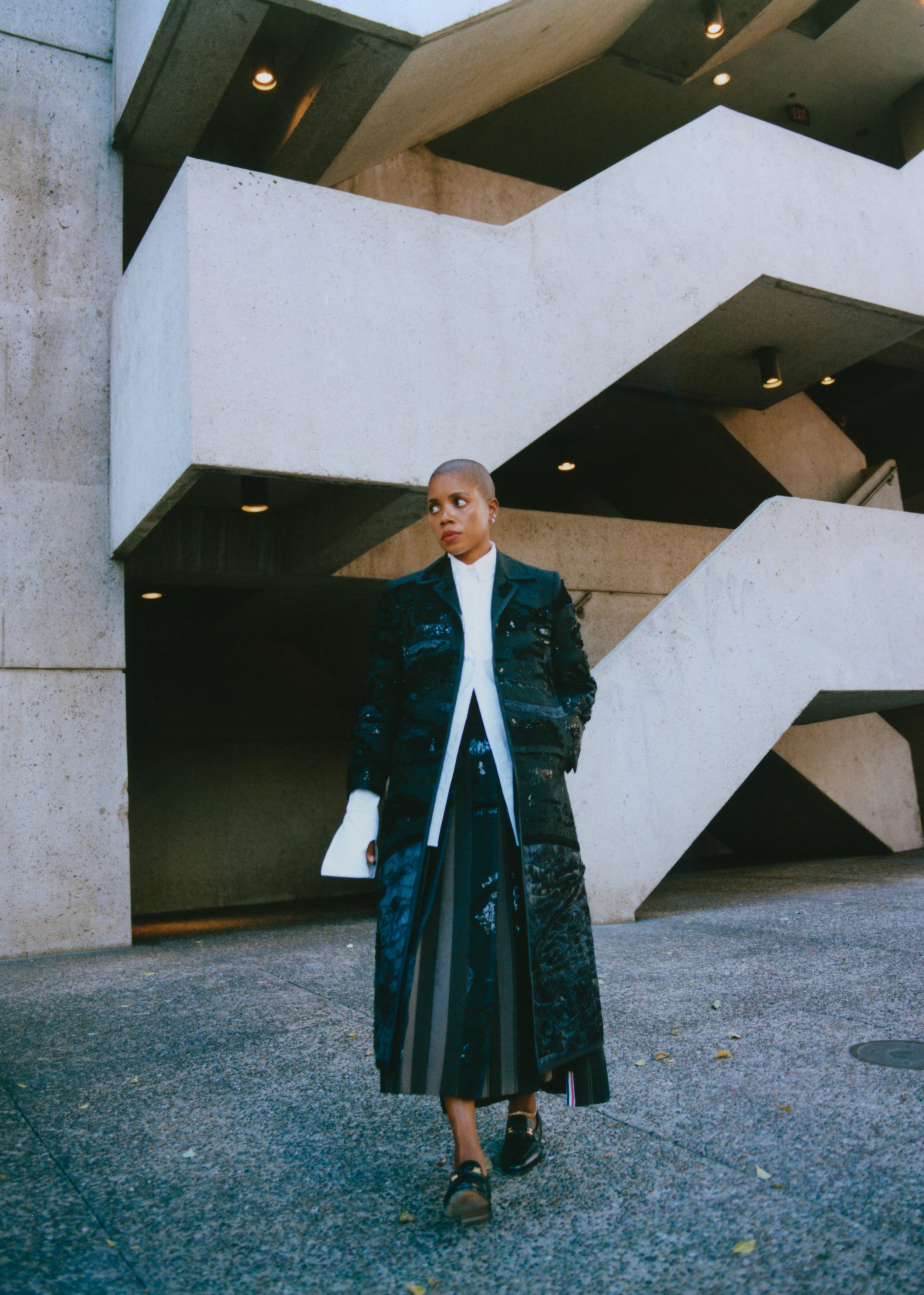
All clothing by Thom Browne. Shoes by Gucci. All jewelry by E.M. Kelly.
Janicza Bravo Lets #TheStory Speak for Itself in ’Zola’
In 2015, a tale about a stripper’s chaotic long-weekend road trip to Tampa captivated the internet. Over the course of 148 tweets, in what is often called the first Twitter thread, A’ziah “Zola” King humorously recounted the story of an ill-fated meeting with a customer and fellow dancer she met while working at a Detroit Hooters and their subsequent whirlwind odyssey together, which quickly turned dark. From her first tweet, King had everyone hooked. “Y’all wanna hear a story about why me & this bitch here fell out???????? It’s kind of long but full of suspense,” she posted alongside four selfies with the woman, kicking off what would become known simply as #TheStory.
Janicza Bravo, the director of Zola, A24’s film adaptation of the saga, was immediately enthralled by King’s tweets. “My reaction was, ’Who wrote this? What? How, who, when, huh?” she says, laughing at the memory of her first readthrough of #TheStory when it originally appeared. Calling herself “a little bit of a dinosaur” at forty, Bravo says she was struck by King’s cadence and unique use of language. “It felt like there was a window into a lexicon that I had not been privy to,” she says, “and I felt like I was getting a front-row seat to this other dimension of the world that we were inhabiting, but it was not a dimension I had ever been invited into.

All clothing by Nour Hammour. Shoes by Gucci. Earrings and bracelet by Leigh Miller. Ring by E.M. Kelly.
In the film, the titular character, portrayed by Taylour Paige, is misled by Stefani (Riley Keough), a new friend who sells her on the idea of a “hoe trip” and a quick cash haul at a fruitful strip club in Florida. Along for the ride are Stefani’s mentally fragile boyfriend and her mysterious “roommate” Z. After a moderately successful evening stripping, Zola becomes aware of the true intentions of the trip when Z leans over and asks, “Y’all wanna trap?” From there, the weekend only becomes more tumultuous—Zola is threatened for refusing to engage in prostitution; Stefani’s boyfriend, deeply riddled with attachment issues, becomes jealous and threatens self-harm; and a rival pimp tries to extort Z for money. Even worse, as Stefani and Zola wait in a hotel room for clients to arrive, Zola comes to realize that Stefani is complicit in bringing girls to Z for the purpose of selling sex. Stefani cowers behind a thinly veiled mask of innocence, and Zola, although angry, takes pity on her when she discovers Z has been underselling her worth, exclaiming, in the now-famous line, “pussy is worth thousands.” Zola takes control in the only way she can, making Stefani a new ad and keeping her safe, teaching her about her own self-worth and hoping to placate a volatile Z.
King received real-time praise from rapt fans on Twitter for her effortless humor and charisma in regaling how the weekend unraveled, using emojis, capslock, and punctuation to punch up each crazy moment. But beneath the sheen of comedic absurdity was a young woman retelling her story of a traumatic event in which she was almost sold into sex trafficking while still a teenager. Through humor, King was reclaiming her past. “When I found out A’ziah King was nineteen, I went back and read it and was kind of in shock,” Bravo says. “She is obviously processing trauma but is using her access to her ‘funny’ to tell it in this wild and radical way, and I think that’s really intoxicating.”
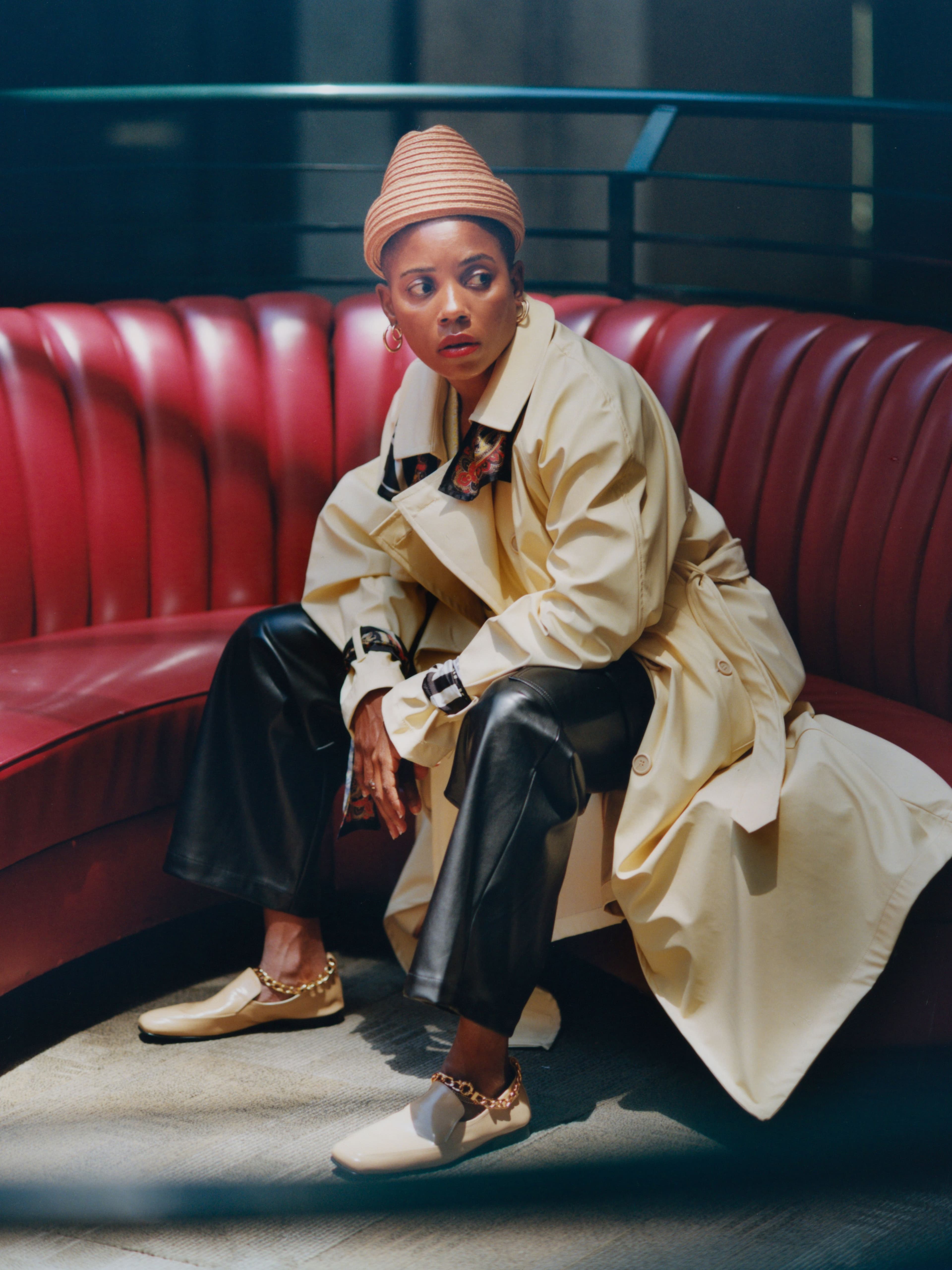
Trenchcoat by Ottolinger. Vest by The Elder Statesman. Pants by Nomia. Hat by ESENSHEL. Shoes by BY FAR. Earrings, Bravo’s own. Ring by E.M. Kelly.
Bravo stayed faithful to King’s story in the screenplay adaptation she began working on a few years ago with the Tony-nominated playwright Jeremy O. Harris, then still a student at Yale, often even including dialogue lifted verbatim from King’s tweets. Although she wasn’t immediately attached to the project (through competitive bidding, the script was picked up at first by James Franco, who stepped down two years later), she says she always knew in her gut that she had to be the one to direct King’s story. “I felt it in my bones,” she says, “and I know that sounds maybe a little bit witchy, that there’s no science in that, it was just something that happened in my body. I think I felt it because I was putting myself in those shoes. I was thinking about, if this were me, what would I need, and if this were me, what kind of care or guidance would I hope for?”
While Franco made assurances that King would receive credit, Bravo pushed even further, advocating for her to come onto the film as an executive producer, and checked in with her constantly throughout the entire project to ensure the story was kept true to her spirit and, most importantly, her voice. “There is a responsibility when you invite people to the table who are not in this business,” Bravo says, “and I would want to make sure that they felt tended to and like they weren’t being taken advantage of because there are so many stories out there that look like that. I wanted to make sure that this one wasn’t going to look like that.”
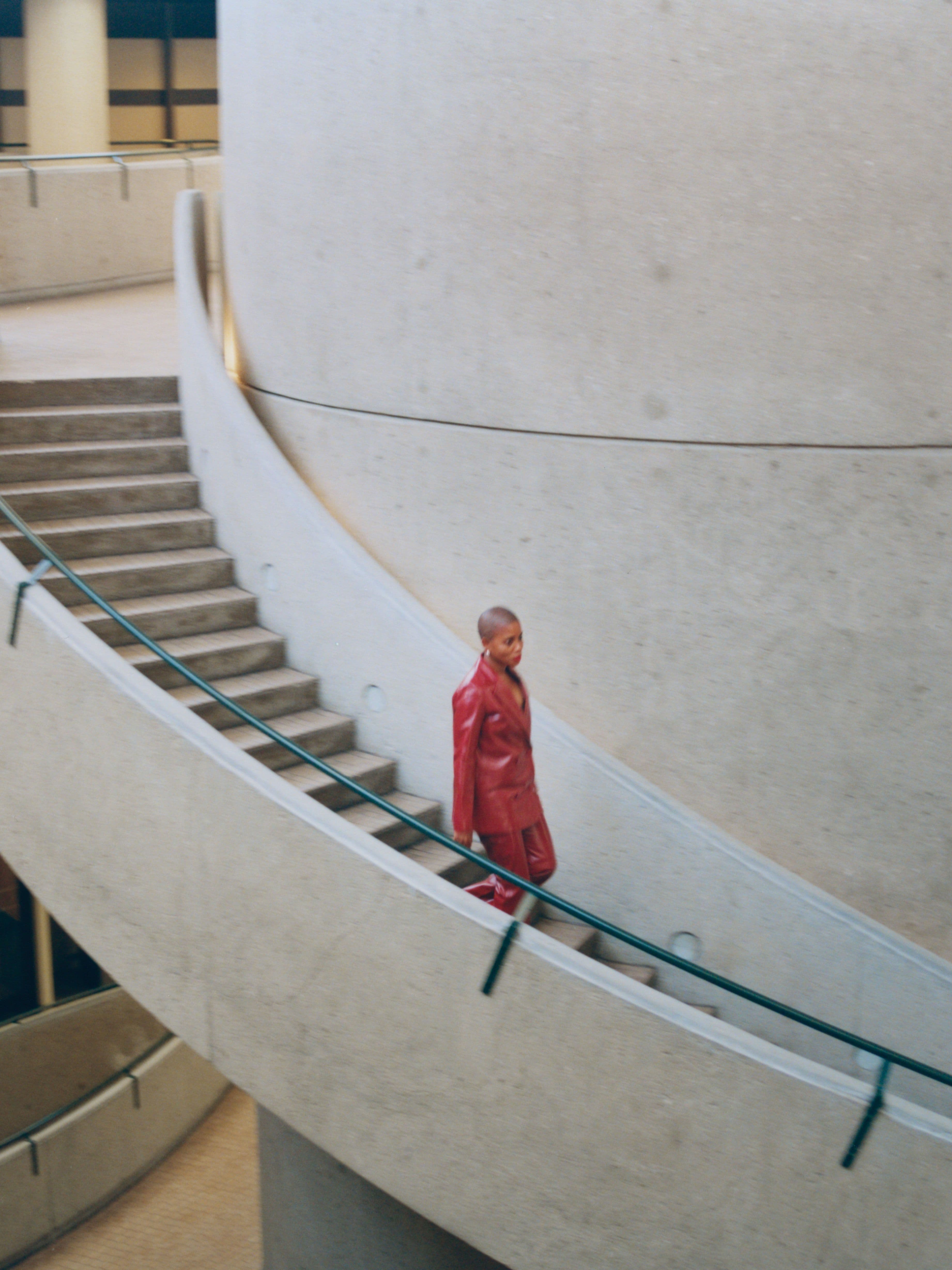
All clothing by Nour Hammour. Earrings by Leigh Miller.
Bravo’s care and consideration extended to her actors as well—from her first brief, she had made the decision not to show any female nudity in Zola. “There is already such a large library of images of women not wearing clothes and did I really need to add to that library?” she muses, adding that she was moved by a friend’s experience as an actress who filmed a nude scene and felt terrible when she realized the film stills would end up among the top search results for her name on the internet. “They had felt really bad about that,” Bravo recalls, “that this work that they were doing in a film that was artful was being redacted from the world of the movie and turned into something salacious or filthy. They were being objectified and the work wasn’t being considered. That really had touched me, and I didn’t want to do that here with our actresses. There is so much vulnerability, they’re exposing themselves so much.”
Instead, Bravo chose to flip the focus on the male body. One montage scene presents a series of close-up shots of naked men, varying in shape and size, while Paige and Keough remain either clothed or obstructed from the camera lens. “I realized that I just didn’t have the library of penises, the ones that existed in my head were really only the ones that I had seen in my own intimate experiences,” Bravo says. “I thought so much about what this movie would have meant to me at seventeen years old and being able to be a seventeen-year-old girl sitting in this movie and seeing something like that.” For decades in film, women have been expected to be the naked party during sex scenes while men are often given the right to modesty. Shifting the gaze gives power back to the women in the scene, while also offering a less glamorous and more honest perspective of a sex worker’s wearisome night on call. “The rush and the power of that moment and being able to walk out of that movie feeling like you own shit and like that’s who that moment is for,” Bravo adds. “It’s also for men too, but specifically for the seventeen-year-old in me. She really needed that moment and she really needs that moment overall.”
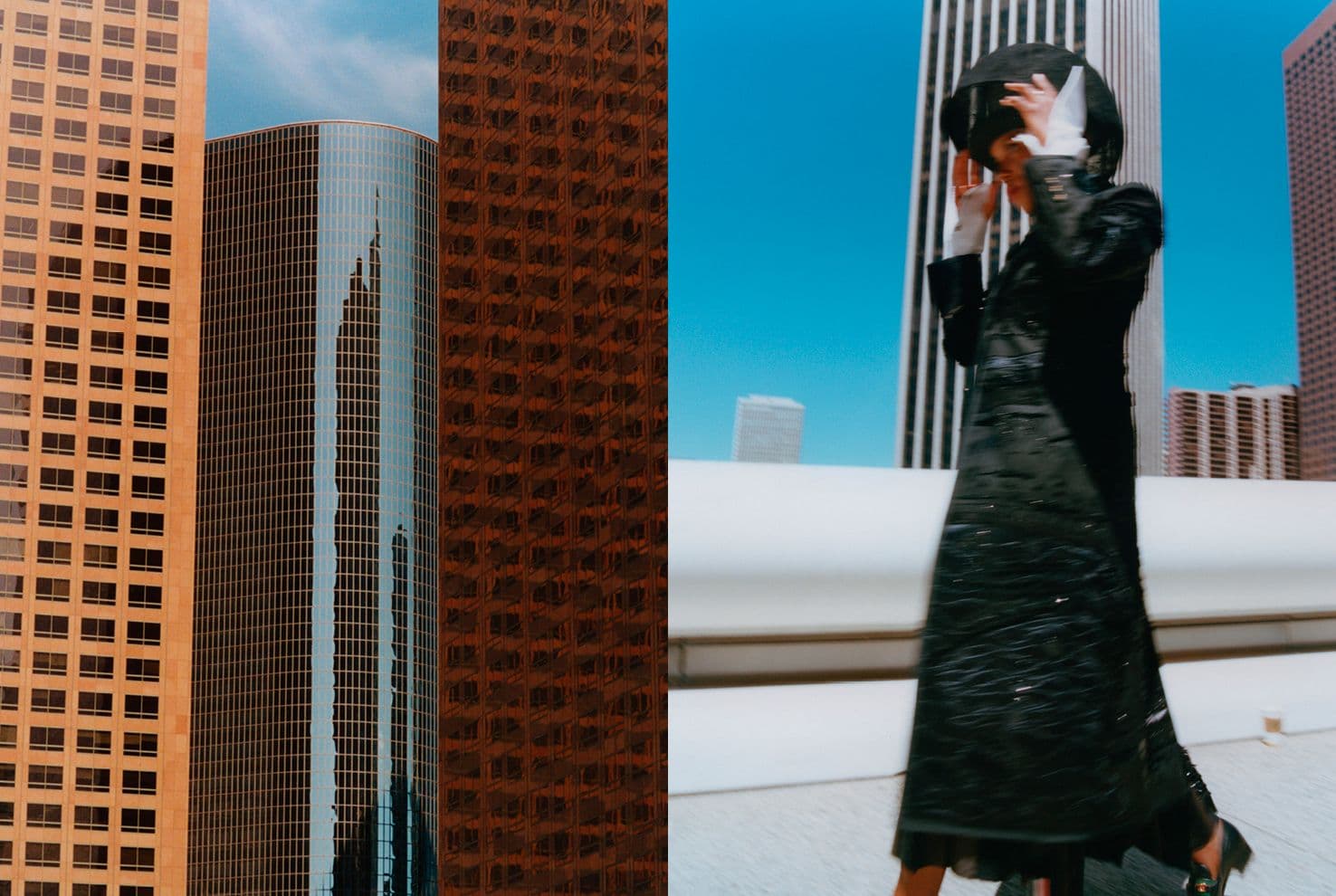
All clothing by Thom Browne. Shoes by Gucci. All jewelry by E.M. Kelly.
The ability to weave comedy and pain together is what makes Bravo’s voice so distinctive—a graduate from New York University’s Tisch School of the Arts, she found her footing as a filmmaker after moving to Los Angeles, where she worked as a stylist and produced small theater performances while writing short scripts on the side. In 2011, after being offered the opportunity by a friendly cinematographer to use their network, she produced her first short, “Eat,” which she wrote and directed, and starred her then-partner Brett Gelman and Katherine Waterston. Her approach, which has often been described as “stress comedy,” can be seen through her entire body of work, as in “Gregory Go Boom,” a story about a paraplegic man’s attempts at dating that won the short-film jury award at the Sundance Film Festival in 2013, or in her first feature, 2017’s Lemon, a delightfully agonizing comedy about a sour, struggling actor that she co-wrote with Gelman. “I didn’t know that it was uncomfortable until we watched it in an audience, I was so used to it. Lemon is a manifestation of the darkest part of my and Brett’s sensibility together,” she says. “It seemed so straight to us in a way, and it wasn’t until we were at opening night at Sundance and the lights were setting and halfway through the screening, I’m like, ‘I think this movie is weird. I think it’s weird.’ We didn’t know that it was, it felt so much like us. Maybe we’re weird, but I think we had fought against that label as being something negative, and so I didn’t know it was strange or off until someone told me it was.”
Like Lemon, Zola contains many such moments where you’re unsure whether to laugh or squirm. “My kind of comedy just happens to be really uncomfortable, that is the thing that I feel very close to and it’s what makes the most sense to me and it is my sensibility,” Bravo elaborates. “That is how I interact. That is the joke that I bring to the table in my day-to-day.” The comedy alone isn’t what makes Zola such a memorable film—the trust that comes from the reciprocal relationship between King’s playful storytelling and Bravo’s perspective is apparent through the screen. “The way I’m approaching all of the work is from a totally earnest place. The energy or the quality that is inside of it is something that happens,” she says of the film. “I think so much of what she was weaving was coming out of circumstance. So my job is to craft the energy around what I think that circumstance is, but allow the actors to be totally earnest inside of that. And if it is funny, that’s great, and if it’s not funny, that’s also great.”
Zola is out today from A24. Read this story and many more in print by ordering our Summer 2021 issue here.
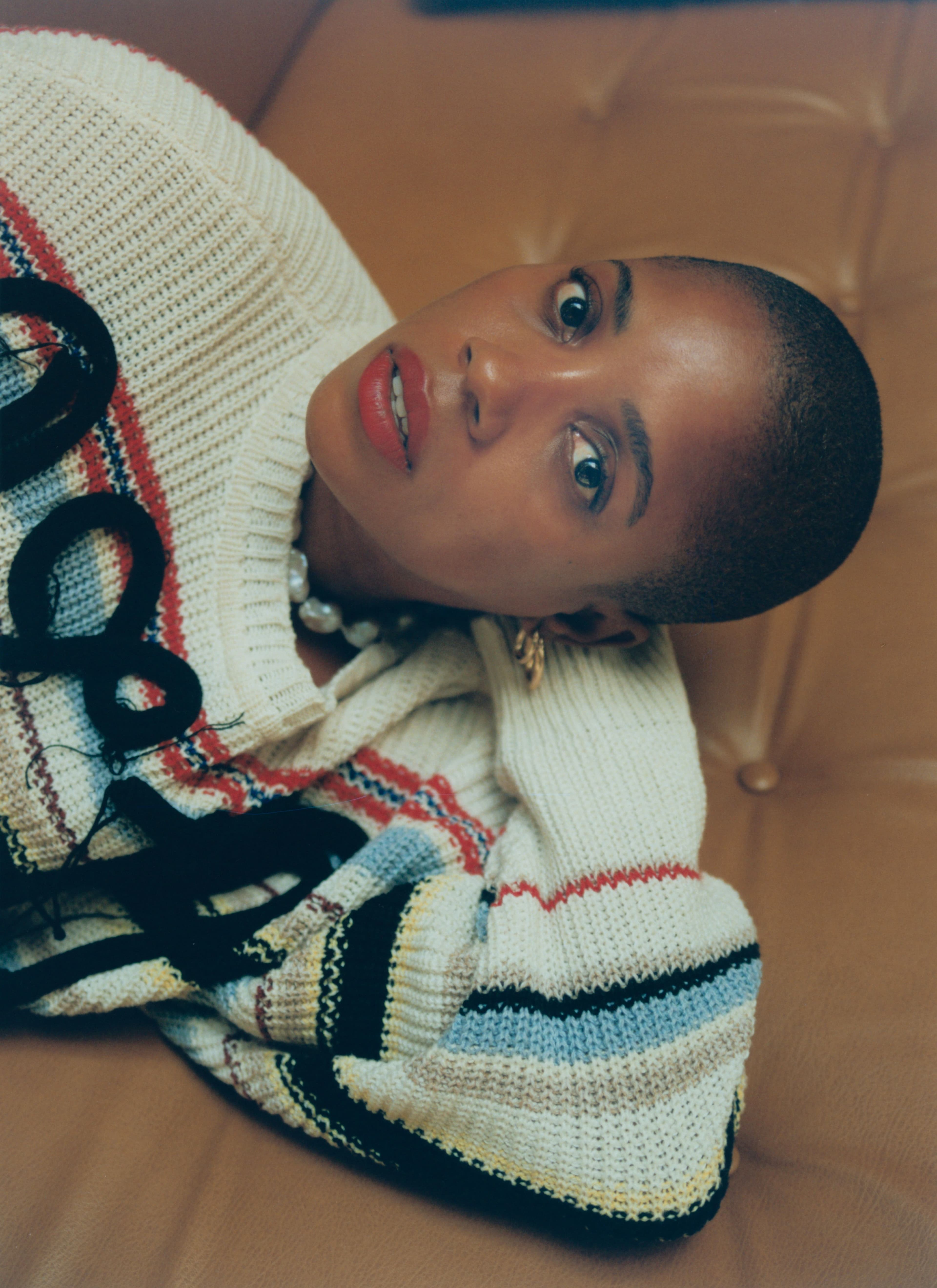
Sweater by Ottolinger. Earrings, Bravo’s own. Necklace by E.M. Kelly.
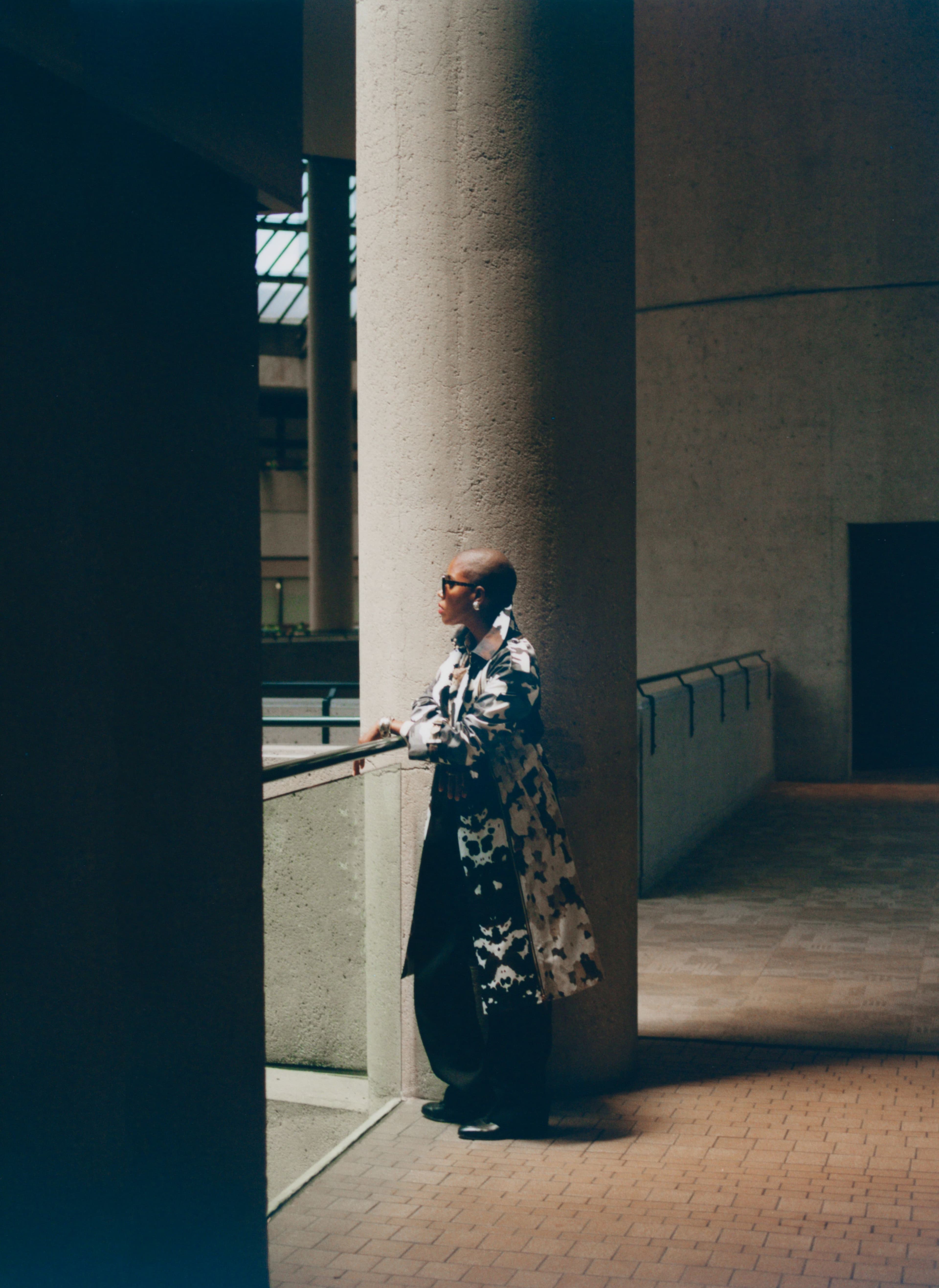
All clothing by Burberry. Sunglasses by Oliver Peoples. Shoes by Gucci. All jewelry by Leigh Miller.
As a nonprofit arts and culture publication dedicated to educating, inspiring, and uplifting creatives, Cero Magazine depends on your donations to create stories like these. Please support our work here.






